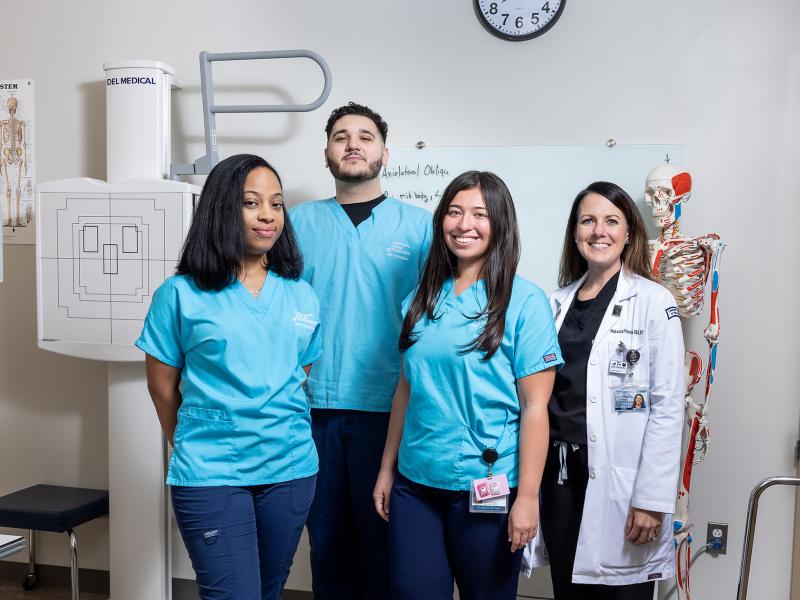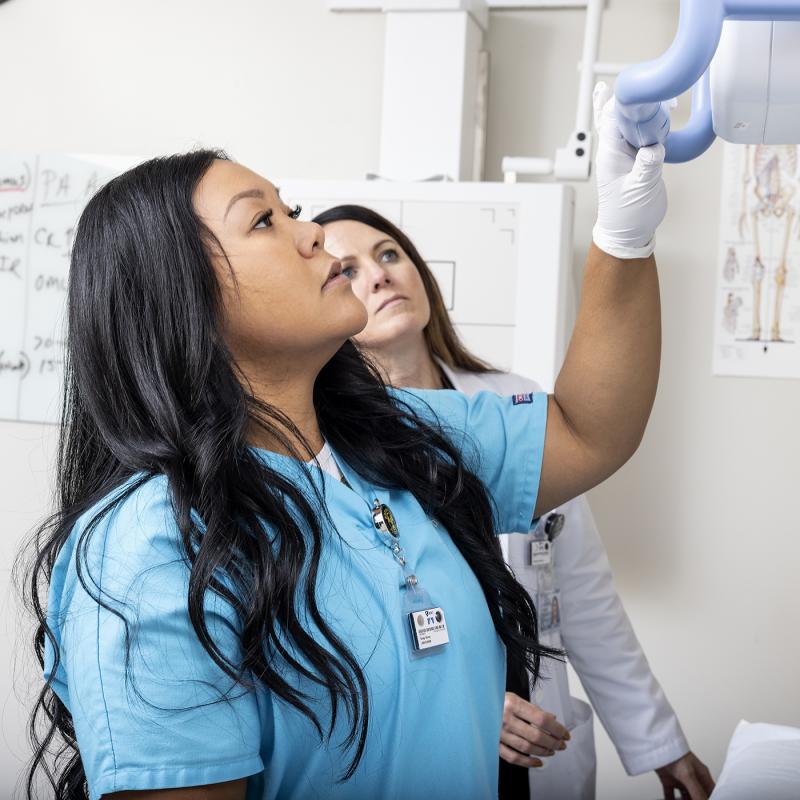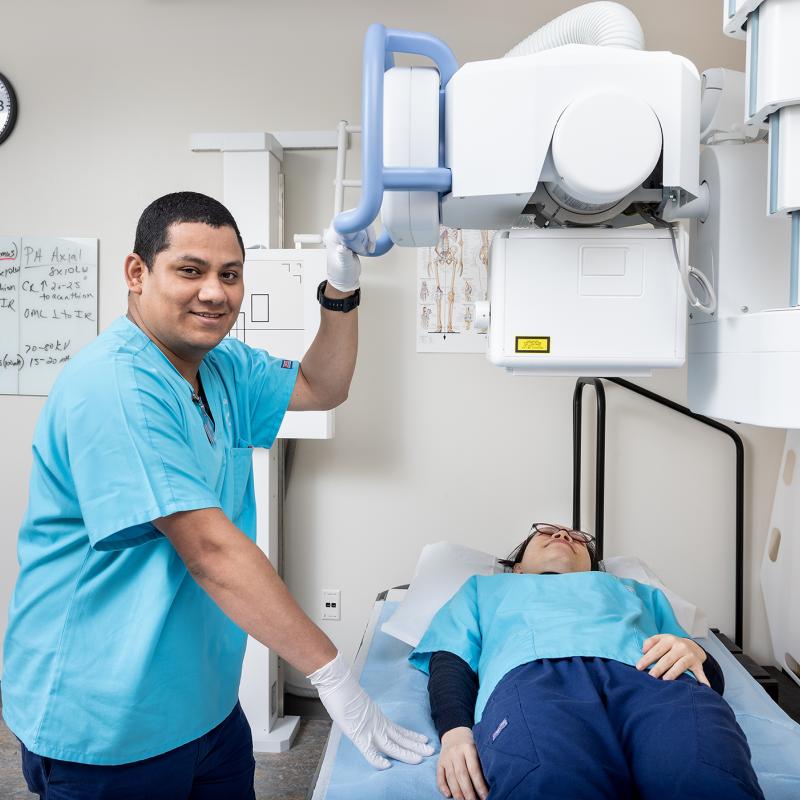Admission into the Diagnostic Medical Imaging Program is selective, competitive, and requires potential students to fulfill all admission requirements of the College. Applications submitted from October 1 until January 1 will receive priority in the Allied Health pre-entrance testing and review process.
Students must meet the following minimum requirements before applying to the Diagnostic Medical Imaging Program:
- High School diploma or GED documentation
- High School Biology or its equivalent (BIOL106) with grade “C” or better in the past 10 years
- Demonstration of readiness for ENGL 101 and FNMT 118 as determined by the College’s placement tests, or by successfully completing developmental coursework
- Minimum grade point average of 2.5
Applicants must be at least 18 years of age by the start of the Diagnostic Medical Imaging clinical experience.
Applicants who are new to the College must begin the application process by first applying to the College. A transcript evaluation (for students transferring credits in from another college) and/or completion of a placement test (or test waiver) is required. Students can apply to the College by visiting the Admissions Process page.
After applying to the Community College of Philadelphia, students will be placed into the Health Care Studies program until they have completed the requirements to be accepted into the program. Health Care Studies is designed for students interested in entering a health care profession.
Transfer Students/Advanced Placement
The Diagnostic Medical Imaging Program does not grant advanced placement status to students who transfer from another Radiography program or are seeking advanced placement to regain eligibility for ARRT certification and registration. These students must apply to the program according to the program entry requirements for all students.
Submitting a DMI Program Application
Current Community College of Philadelphia students can begin the Diagnostic Medical Imaging program application process by visiting the Diagnostic Medical Imaging Program Intake Process page.
Applicants must:
- Complete and sign a DMI program application form
- Submit official copies of supporting documents (e.g., transcripts)
- Complete the pre-entrance Allied Health testing program with benchmark score or higher
Applicants who complete and meet the aforementioned requirements will be eligible to continue in the admissions process and will be contacted, in writing, concerning the scheduling of an admissions interview with the Program Director (or designee). An admission interview is not guaranteed and will only be granted to highly qualified applicants. A scheduled interview also does not guarantee admission. Applicants will be asked to submit the following if they are called for an interview:
- Résumé with letter of intent
- Two recommendation forms
Upon completion of the admissions interview, the Program Director (or designee) will review and score all applicants with particular attention to:
- Cumulative grade point average
- Strength of secondary/post-secondary academic curriculum
- Allied Health pre-entrance examination score
- Extracurricular activities, community service, and work experience
- Personal interview
Conditions for Acceptance
All applicants are notified in writing regarding the admissions decision. All offers of acceptance are contingent upon successful completion of the following:
- Acknowledgement of Core Performance Standards for Health Care Career Programs and physical demand analysis.
- Clinical education requires a full range of motion, including pushing, pulling, twisting, lifting and bending. Standing and walking are required for the entire clinical day (8 hours). Students who are registered with the Center on Disability must inform the Program Director if special accommodations are required.
- Completion of Criminal Background Check
- Conviction of serious and/or violent crimes results in denial of admission into the DMI Program.
- Upon completion of the DMI Program, students will be eligible to apply for the American Registry of Radiologic Technologists certification examination in Radiography. The ARRT reserves the right to deny or reject an application for certification as stated in the ARRT Standards of Ethics. Prior to applying to the DMI Program, candidates are encouraged to complete an Ethics Review Pre-Application with the ARRT for the following circumstances:
- Criminal proceedings including: Misdemeanor charges and convictions; Felony charges and convictions; Military courts-martials; and/or
- Disciplinary actions taken by state or federal regulatory authority or certification board; and/or
- Honor code (academic) violations.
- Completion of Child Abuse Clearance
- Any record results in denial of admission into the DMI Program.
- Completion of Drug Screening
- A positive screening results in denial of admission into the DMI Program.
Additional conditions for Program commencement include:
- Documentation of a complete physical examination, including required laboratory tests. All health information is kept confidential. Students will have direct contact with patients, and have the responsibility to maintain very high standards of health practice.
- Documentation of up to date immunizations prior to clinical assignment. Additional immunizations (e.g. influenza) may be necessary.
- Documentation of current health insurance coverage, which must be maintained throughout the Program.
- Attendance at scheduled Program orientation prior to entry.
- Purchase of DMI student uniform.
- Adult, child, and infant CPR certification for Healthcare Providers (due prior to the commencement of Clinical Education I).
Tuition, Fees, and Refunds
Continuation in the DMI Program requires all College financial obligations to be met. Tuition for the DMI Program varies based on student residency. Tuition and fees for College courses can be found by visiting the Tuition and Fees page. Payment options can be found by visiting the Payment Options page. Additional DMI Program expenses include textbooks, uniforms, pinning ceremony (pin and lab coat), radiographic lead markers, meals, transportation, and the ARRT Radiography examination application fee.
Download a copy of estimated DMI program expenses.
Disciplinary Action
Involvement in any incident which resulted in disciplinary action against a student at the Community College of Philadelphia or any post-secondary institution is considered in the admissions process. The Diagnostic Medical Imaging Program reserves the right to deny admission to any applicant who has a documented history of violating College rules and/or regulations or who has been previously suspended or expelled from the College or any other post-secondary educational institution. Students subjected to sanction as a result of violating an academic honor code or suspended or dismissed by an educational program may not qualify for the ARRT certification examination.
Reconsideration
An applicant who believes that an error of fact has been made in terms of the information provided to the decision making committee can request reconsideration by the committee. This request must be made in writing within 10 days from the date of the letter notifying the applicant of the decision. The reconsideration should address what the applicant considers to be errors of fact. Following reconsideration by the decision making committee, the applicant can appeal the committee's decision to the Vice President for Academic and Student Success whose decision is final.
Any official change or the initiation of any governmental proceeding affecting the information revealed by the required criminal or child abuse background check must be reported immediately to the Program Director of DMI.
Dismissal from the Program
The DMI program reserves the right to dismiss any student:
- who fails to observe the regulations of the College and its clinical affiliates,
- whose general conduct is detrimental to the College and its clinical affiliates, and/or
- who does not meet the scholastic requirements of the Diagnostic Medical Imaging Program. A student who receives a grade of "D" or lower in any course will be dismissed from the program.
Readmission Policy
The DMI program is intended to be completed in twenty-four months beginning in July of each year. In order to progress through the program, students must complete all curriculum courses with a grade of "C" or better and maintain a GPA of 2.5 or higher. Eligible students seeking program readmission must do so within twelve (12) months of program separation. Program readmission is not guaranteed and is dependent upon program capacity and availability. A student must be eligible for readmission according to the College standards. Students who request to be considered for program readmission must meet the current admissions criteria and requirements at the time the request for readmission is placed. Readmitted students must follow the curriculum requirements at the time of their return to the program. A student may only be readmitted to the program once.
Eligible Students
- Students who withdraw from the DMI program in good academic standing (grade "C" or better in all completed curriculum courses and GPA of 2.5 or higher)
- Students who are dismissed from the DMI program due to a grade "D" or lower in any academic course, with a GPA at time of readmission request of 2.5 or higher
Ineligible Students
- Students who are dismissed from the DMI program due to a grade "D" or lower in any clinical course
- Students who are dismissed from the DMI program due to inappropriate conduct and/or violations of the College’s academic integrity policy, clinical code of conduct, moral/ethical standards, professional standards, performance standards or accreditation standards
Process for Readmission Consideration
In order to be considered for program readmission, the applicant must:
- Meet all current admission guidelines.
- Submit a written request to the DMI Curriculum Coordinator. Request must be received at least three (3) months prior to the expected date of enrollment.
- Successfully complete a comprehensive written exam as scheduled by the DMI Curriculum Coordinator. The exam content will include current material from courses which the student previously completed with a grade "C" or better.
- Successfully demonstrate clinical competence through simulation testing as scheduled by the DMI Curriculum Coordinator. Competency procedures will be selected based on the course(s) the student has successfully completed with a grade "C" or better.
The results of the written exam and competency testing, as well as the student’s prior academic and clinical progress, will be evaluated by faculty to determine the student’s potential for success in the Program and semester placement. DMI courses are offered chronologically and only once a year, therefore a readmission date will be based on the semester in which the courses are being offered.
Repeat previously completed courses as recommended by Program faculty. Curriculum analysis is conducted annually and course content may change to ensure Program alignment with the American Registry of Radiologic Technologists (ARRT) Content Specifications for the Examination in Radiography and the American Society of Radiologic Technologists (ASRT) Radiography Curriculum. Repeating of recommended courses ensures the student is appropriately prepared for Radiography certification and registration in accordance with the ARRT.
Clinical Obligations
The DMI Program places a strong emphasis on clinical education with its competency-based curriculum. The clinical education component provides students with the opportunity to practice and apply the skills necessary to become competent entry-level Radiologic Technologists. Students accepted into the DMI Program should expect to spend a minimum of 16 hours/maximum of 32 hours in clinical each semester, except for the first late summer term. Students will follow a structured clinical rotation schedule throughout seven (7) clinical education courses. Clinical rotations are scheduled Monday through Friday between the hours of 7:00 a.m. and 5:00 p.m.
| Clinical Education Course | Semester | Clinical Days | Weekly Hours |
|---|
| DMI 196 - Clinical Education I | Fall Year 1 | T, R | 16 |
| DMI 197 - Clinical Education II | Spring Year 1 | T, R | 16 |
| DMI 198 - Clinical Education III | Early Summer Year 1 | M, T, W, R | 32 |
| DMI 199 - Clinical Education IV | Late Summer Year 2 | M, T, W, R | 32 |
| DMI 297 - Clinical Education V | Fall Year 2 | M, W, F | 24 |
| DMI 298 - Clinical Education VI | Spring Year 2 | M, W, F | 24 |
| DMI 299 - Clinical Education VII | Early Summer Year 2 | M, T, W, R | 32 |
Public transportation is available to all clinical affiliates:
DMI students within the assigned hospital that is affiliated with the College are expected to conduct themselves accordingly. All required and published personnel policies, standards, and procedures of these agencies must be followed. Clinical assignments will not take place unless students are compliant with all clinical clearance requirements. This includes a criminal background check, child abuse clearance, drug screening, completed health form packet (physical examination and immunizations), proof of medical insurance, and CPR certification. Students are liable for their own medical and hospitalization insurance and are required to carry this insurance throughout the duration of the program. Students are covered by the malpractice/liability insurance carried by the College. Students must also attend three mandatory components of new student orientation:
Program orientation (part I) takes place prior to program commencement in June. It includes a comprehensive review of the program policy manual, DMI curriculum, College resources (e.g., Learning Lab, Counseling), uniform fitting and completion of multiple required forms.
Clinical orientation (part II) takes place immediately following the DMI 101 final exam (late August) and consists of a comprehensive review of clinical education expectations and evaluations, including ARRT competency requirements, E*Value use and all clinically related policies and procedures (e.g., supervision, radiation safety, attendance, dress code).
Hospital orientation (part III) takes place the week prior to the first fall semester and Clinical Education I (DMI 196) commencement. Students spend 1 ½ days at their assigned primary clinical affiliate. Orientation at any alternate site will take place on the first day of the rotation with an assigned Clinical Preceptor.
Student Safety
Radiation Safety
Exposure to ionizing radiation will occur during on campus lab and clinical education. Students are required to follow all program radiation safety policies.
Magnetic Resonance Imaging Safety
Magnetic resonance (MR) is a medical imaging system in the radiology department that uses a magnetic field and radio waves. Exposure to magnetic fields can occur during clinical education and MRI safety is covered as part of the new student orientation. This magnetic field could potentially be hazardous to students entering the environment if they have specific metallic, electronic, magnetic, and/or mechanical devices. Students are screened for magnetic field/radiofrequency hazards in accordance with the American College of Radiology MR safety guidelines to identify any potential hazards of entering the magnetic resonance environment before beginning clinical rotations. Specific devices such cardiac pacemakers, hearing aids, aneurysm clips, implants, and insulin pumps may preclude students from participating in some clinical experiences but will not affect program completion.
Pregnancy Policy
If a student becomes pregnant while enrolled in the Diagnostic Medical Imaging Program, disclosure of the pregnancy is entirely voluntary. However, since radiation to the unborn child could be harmful, the student is strongly encouraged to notify the Program Director in writing once confirmation of the pregnancy has occurred. Upon notification, the student will be scheduled to meet with the Radiation Safety Officer or Radiology Department Physicist at the appointed clinical education setting. During the meeting, the student will be provided with potential risks and consequences of prenatal radiation exposure.
The student may then choose to do one of the following:
- Withdraw immediately from the Program in good standing. A student who withdraws from the Diagnostic Medical Imaging Program because of pregnancy can gain readmission to the Program by following the established readmission procedure.
- Remain in the Program without modification. If the student chooses to do so, the following will occur:
- The student will provide documentation to the Program Director of conception date and expected delivery date.
- The student will sign a “Pregnancy Declaration” as required by the clinical affiliate.
- The student will be provided with ALARA training at the clinical education setting to ensure the monthly embryo-fetal dose does not exceed the NCRP recommendation of 0.5 mSv (5.0 mSv for the entire pregnancy). Neither the College nor the clinical affiliate can assume responsibility for any harm that might occur to an embryo or fetus as a result of exposure to ionizing radiation.
- Depending upon clinical affiliate policy, the student may be provided with a monthly fetal badge. The badge must be worn at waist level, under the lead apron.
- Withdraw the declaration of pregnancy. The declaration of pregnancy may be withdrawn at any time by contacting the Program Director in writing.
MRI Pregnancy Notice: The declared pregnant student who continues to work in and around the MR environment should not remain within the MR scanner room or Zone IV during actual data acquisition or scanning.
DMI Program Policy Manual
DMI Clinical Expectations and Evaluations Manual





